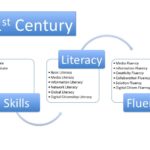Critical Thinking Essentials: Identifying Problems Without A Guide

While whole books could be written on the subject — and many have been — we’d like to focus on one particular attribute that frequently turned up in the dialogue.
The ability to define problems without a guide.
Why is it so important for a student or test taker to be able to undertake this task? After all, shouldn’t your primary objective be finding solutions to problems? Isn’t it a little supervisory to stand around pointing out the issues without offering any viable solutions?
Well yes, as a matter of fact it is. That’s why it’s important for you to fully understand the tool of deconstruction. It will be the most valuable weapon that you have in your arsenal. If you have a clear sense of problem architecture, then you won’t have any issues taking a part a test question and seeing how it works.
That’s not to dismiss the effectiveness or necessity of a quality teacher. Students need guidance and modeling to understand new concepts and forge ahead in their education. But the ultimate objective of any strong education system should be learning how to learn, not simply having all the right answers or building an impressive collection of knowledge without any real use.
So what are some ways that students can begin to identify problems without guidance? We’ve managed to think of a few.
First, Extra Credit Opportunities.
If a teacher offers an independent study project for bonus points, take them up on it. Not only will it ingratiate you to the teacher, potentially help your grade, and possibly even prove to be fun, but it will also challenge you in ways similar to what you will experience in the “real world.” Bosses won’t always hold your hand through everything you do. The higher up the ladder you go, in fact, the more you’ll learn that they like to do as little as possible. That’s not a knock; it’s just good business. No one wants to kill themselves over a dollar. Instead they want to maximize earnings for the least amount of work (commonly referred to in business as the rule of 80/20, or 80 percent of income comes from 20 percent of efforts). The more you can take on without guidance, the easier it will be to win trust and responsibility.
Secondly, Working A Part-Time Job.
Too often, students take it easy through their entire college careers when they really should be stepping out into the world and adding responsibility. After all, when you cross that platform and collect your degree, you also must start the long, arduous task of paying back the many thousands of dollars that you probably had to borrow. At this point, it’s helpful to have work experience to go along with the education. It will also help you more easily adjust to a full-time career.
Thirdly, Volunteer For Community Service.
Taking the initiative to help serve the community will help you realize what challenges are out there to encounter and what you can help to solve. Depending on the project, you can really tap in to your critical thinking and problem solving abilities — both necessities as you delve in to standardized testing and, eventually, the job market.
Fourthly, Sign Up As A Tutor.
Learning how to help others work through issues is a classic way of identifying problems on your own. By meeting someone else where they are, and helping them to master their studies, you step out of the role of student and into the role of teacher, master, and overseer. In this mindset, you move away from a direct focus on the problem and think instead about the tools needed to find a solution rather than the answer itself.
Fifthly, Take On More Critical Thinking Study Problems Than Direct Answer.
Perhaps the most frustrating things you’re likely to encounter when taking a standardized test are the critical thinking questions. Often times the hardest part is trying to figure out what in the heck is being asked. When you prepare for exams, you’re best served to focus on practicing with these questions rather than the direct answer types. Tests are designed to trick you and test your problem solving abilities. It’s not strictly about how well you know the subject matter. Rather it’s about how good you are at picking up on context clues, and how you use and understand the language.
Finally, Start Your Own Small Micro-business.
It’s not the norm for a student to launch a multimillion dollar enterprise like Summ.ly and sell it to Yahoo! at the age of 17, but it does happen. Luckily, you don’t have to be that successful in your own endeavor. In fact, even if you never make a full $10 in profit, the experience of running your own small business — be it as a lawn care provider in your neighborhood or a sno-cone maker at your parents’ stand during the summer — will give you a much needed taste for identifying and solving problems using your own knowledge and understanding.
In Summary
While being able to identify a problem without needing external guidance may seem like an incomplete way of thinking, it does get you to open your mind to the possibilities. By challenging yourself — to learn the question and the multiple repercussions of each outcome — you force yourself to plug in every option until arriving at a natural answer that presents a deeper understanding of the question. And that’s precisely the kind of foresight that will take you in new and exciting directions throughout your life.
Until next time, what are some cool methods you’ve used for taking the bull by the horns and doing your thing? Have there ever been times when you weren’t even sure what the question was in life? Share your experiences with us in the comments section below.









this is very informative. it helped